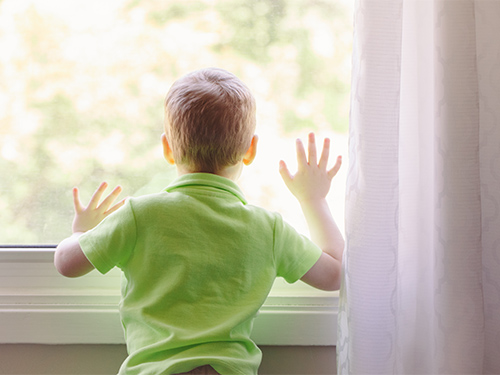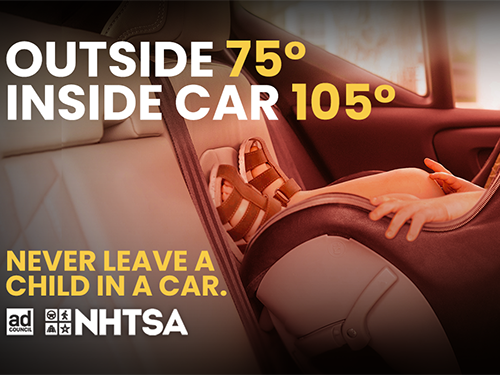(Posted 2023 July; Updated June 2025)
Most parents and caregivers are aware that children’s natural curiosity, innocence, and determination are a combination that can get them into trouble in the blink of an eye. Sadly, too often in the summer, the news includes reports of families forever changed by preventable accidents that led to the injury or death of a child.
Changes to everyday routines, new and different activities, unfamiliar locations (due to travel), and less supervision of children create more potential dangers.
The Parenting Education Programs is sharing this reminder about some seasonal dangers, and offering tips from safety experts to help you keep your children safe for many summers to come.
Prevent Falls from Open Windows
Falls from windows are more common than people might think. According to U.S. Consumer Product Safety Commission (CPSC) data, an average of eight children age 5 and younger die and more than 3,300 are injured each year from falling out of windows. Sadly, there were two falling incidents in neighboring jurisdictions in May 2025.In one case a 2-year-old fell 15 stories from a balcony and in the other a 3-year-old fell from an open window. Thankfully, their injuries were not life-threatening.
 Many adults fail to realize that open windows are a risk to children. A screen is no match for the weight and force of a child pushing against it, and it will not prevent a child from falling.
Many adults fail to realize that open windows are a risk to children. A screen is no match for the weight and force of a child pushing against it, and it will not prevent a child from falling.
According to Fairfax County Fire and Rescue, windows must operate easily for emergency exits in case of a fire, but “childproof” by following these safety tips:
- Keep children away from open windows.
- Never leave children alone in rooms with open windows.
- Open windows from the TOP when possible, or only open four inches from bottom.
- Keep beds, chairs, and other “climbing aids” away from windows.
- Consider installing window guards.
- Educate older children about the dangers of open windows.
Prevent Hot Car Deaths
No parent wants to believe that they could forget their child in the car. However, a rear facing car seat looks the same to the driver whether a child is in it or not. When parents are rushed or distracted, or alter their normal routines, it can lead to a lack of awareness that a quiet or sleeping child is still in the car seat.
However, the inside of a locked car can become dangerous very quickly. In just 10 minutes, the temperature in a car can rise 20 degrees above the outside temperature (and climbing), while a child's body temperature rises 3-5 times faster than that of an adult.
Since 1990, at least 1,125 children have died when they were left or became trapped in a hot car. In most situations these were the children of loving, responsible, and protective parents who simply became distracted and unknowingly left their children in the vehicle.
To prevent this tragedy from happening to you, https://www.KidsandCars.org offers some suggestions.
 Never leave children alone in or around cars; not even for a minute.
Never leave children alone in or around cars; not even for a minute.
- Place the child’s diaper bag or item in the front passenger seat as a visual cue that the child is with you.
- Make it a habit of opening the back door every time you park to ensure no one is left behind. To enforce this habit, place an item that you can’t start your day without in the back seat (employee badge, laptop, phone, handbag, etc.)
- Ask your child care provider to call you right away if your child hasn’t arrived as scheduled.
- Clearly announce and confirm who is getting each child out of the vehicle. Miscommunication can lead to thinking someone else removed the child.
Make sure children cannot get into a parked car:
- Always keep vehicles locked, especially in the garage or driveway.
- Keep car keys out of children’s reach.
- Use childproofing knob covers and door alarms to prevent children from exiting your home unnoticed.
- Teach children to honk the horn or turn on hazard lights if they become stuck inside a car.
- If a child is missing, immediately check the inside, floorboards, and trunk of all vehicles in the area carefully, even if they’re locked.
If you see a child alone in a locked car, act immediately and call 911. A child in distress due to heat should be removed from the vehicle as quickly as possible and rapidly cooled.
Promote Water Safety
 Swimming pools, beach and lake trips are a staple of the summer outdoor season. The Virginia Department of Social Services has compiled a list of helpful water safety tips to keep everyone safe on the water this summer. Be aware that drowning is the leading cause of death for children 1-4 years old. It can happen in only 20 seconds, and in as little as 1 inch of water.
Swimming pools, beach and lake trips are a staple of the summer outdoor season. The Virginia Department of Social Services has compiled a list of helpful water safety tips to keep everyone safe on the water this summer. Be aware that drowning is the leading cause of death for children 1-4 years old. It can happen in only 20 seconds, and in as little as 1 inch of water.
- Children need constant supervision by a safe and sober caretaker while swimming.
- Teach your child to swim as early as possible and contact local community agencies for information about lessons.
- Always swim with a buddy; do not allow anyone to swim alone. Even at a public pool or a beach with a lifeguard, use the buddy system!
- Always stay within arm’s reach of young children and avoid distractions when supervising children around water.
- Children or inexperienced swimmers should wear U.S. Coast Guard-approved life jackets around water (do not substitute water wings or other flotation devices for life jackets).
- Swimming pools should be surrounded by a fence at least 4-feet high with gates that are self-closing, self-latching and open outward, and away from the pool. The latch should be high enough to be out of a small child’s reach.
- Remove any structures that provide access to the pool, such as outdoor furniture, climbable trees, decorative walls, and playground equipment.
- Keep toys that are not in use away from the pool and out of sight. Toys can attract young children to the pool.
- Be aware of potential rip tides and teach children what to do if they encounter one.
- Ensure that all children are wearing sunscreen, even on cloudy days, and reapply often.
- Do not go in the water with an open wound.
- Be aware that beaches have litter, sharp glass and other debris, and wear sand socks or water shoes for protection.
Don’t become a statistic or a story on the evening news. Follow these tips to help your family have a safe and healthy summer.
The Parenting Education Programs is now enrolling for upcoming classes. Join us for more information about positive and effective ways parents can interact with their children at every age and stage of development. We would love to hear from you. If you have questions or feedback about the topic in this article email us.
This posting is part of the Department of Family Services' Community Corner where you’ll find timely information about upcoming events, parenting and wellness tips, programs and services, and more! Share these helpful posts with your friends and family. Don't miss out on future postings! Sign up today!

